CW/TW: mentions of suicide, spoilers.
This is a spoilery review, so beware: read it if you have already played the game or if you don’t mind spoilers (I won’t really reveal stuff like “the end of the game” and other major plot points, just specific details throughout, so this shouldn’t ruin the experience of the main plot).
Arcade Spirits: The New Challengers is a sequel to Arcade Spirits, an arcade-themed, queer-friendly visual novel released in 2019 by Fiction Factory Games. I really enjoyed the first installment, which I got in the Bundle for Racial Justice and Equality from itch.io, and I had been looking forward to playing AS: TNC for a very long time. Fortunately, I got the chance to do so recently, and it was a lot of fun.
After posting some comments and screenshots on Mastodon, I thought it would be interesting to write a review of the game from my point of view. So here it is! A list of pros and cons, and a final verdict, on Arcade Spirits: The New Challengers.
The nice stuff
- It ties well with the original. AS: TNC lets you load your savefile from part 1, which changes some minor aspects of the plot depending on the decisions you took in the previous game. It also has several characters reappearing. Ben and Matt are my favorites – such a fun pair! Other characters don’t reappear directly but are mentioned during conversation.
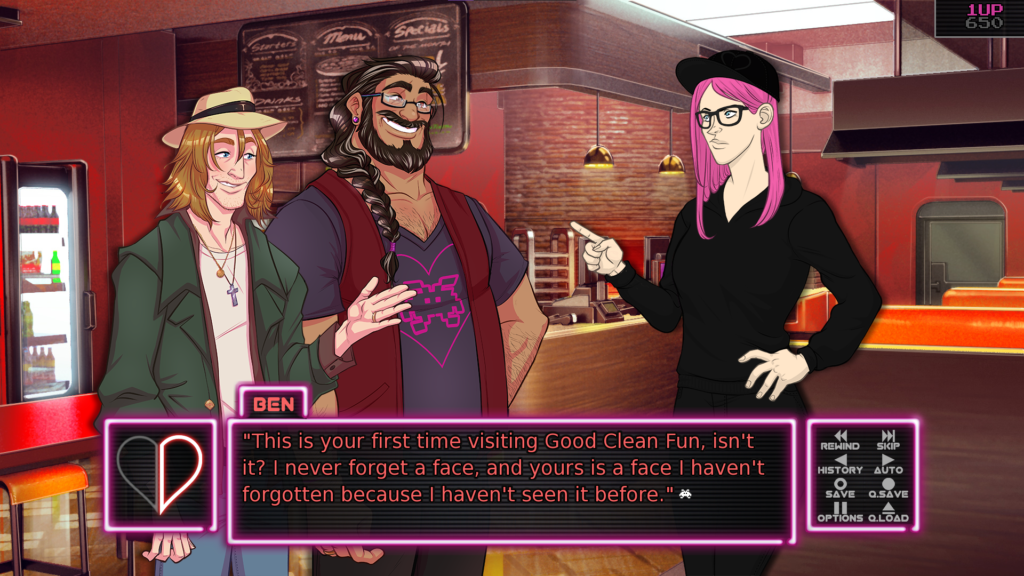
- The meta humor is amazing. I snorted and even laughed out loud several times during my first playthrough. There are constant references to current gaming culture, corporate media, copyright law and all kinds of stuff, without breaking the fourth wall directly. This is very much on-brand, which you’ll soon realise if you follow Fiction Factory Games in any social media.
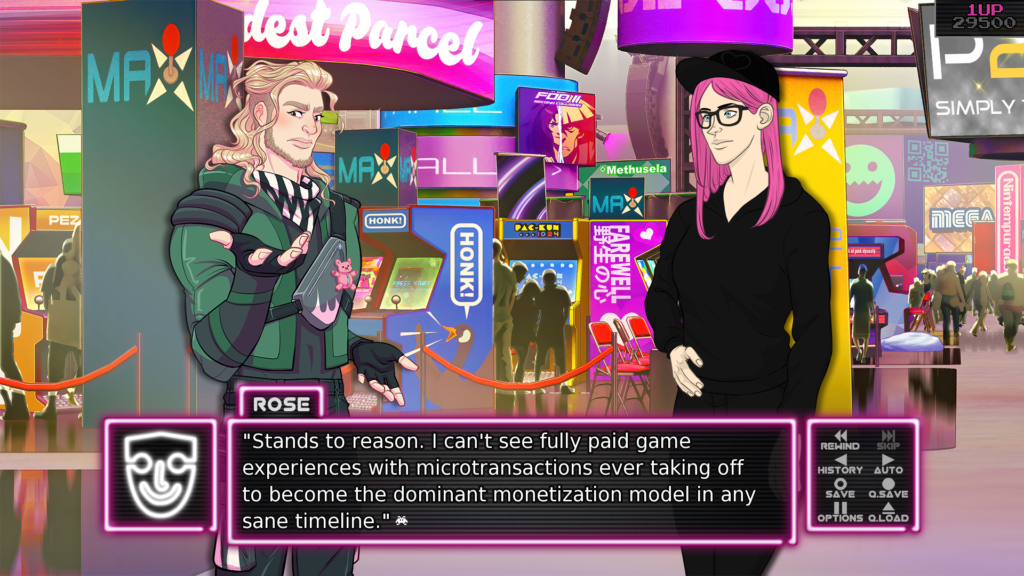
- There’s so many penguins. Seriously. Part 1 had a lot of penguins everywhere already, but here there’s an entire amusement park dedicated to Pengy, the corporate penguin mascot. My paradise.
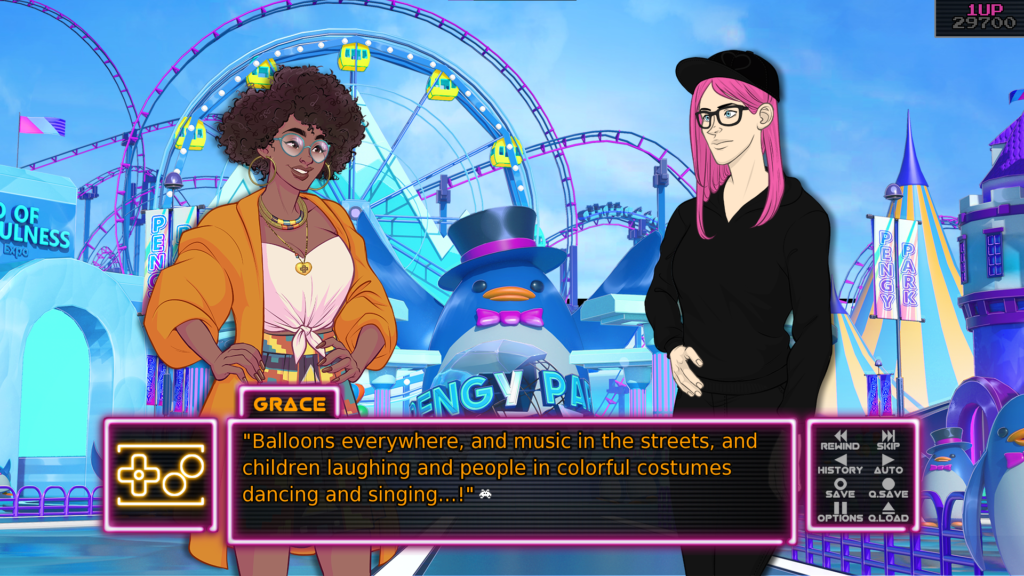
- Incredible background art. The background art was already good in the original, but in AS: TNC I was blown away by the sheer detail and personality of each environment. The images aren’t static, but have simple animations, particularly in their lighting, that bring them to life. I feel this game is a practical lesson on how to do VN background art well.
- Well-designed characters. The main characters are very varied, both in their visual design and personalities. I love them all. There’s also very solid nb representation, with two non-customisable characters who are nb (and this time straight away, unlike (SPOILERS FOR PART 1) Ashley in the previous installment, which only reveals themselves as nb/gender-questioning when you romance them). Each character is also representative of at least one or two social or mental issues, which makes this a very attractive game for left-leaning people who worry about this kind of stuff, and that’s definitely the intended target demographic for this kind of VN (more on that in the “cons” section…).
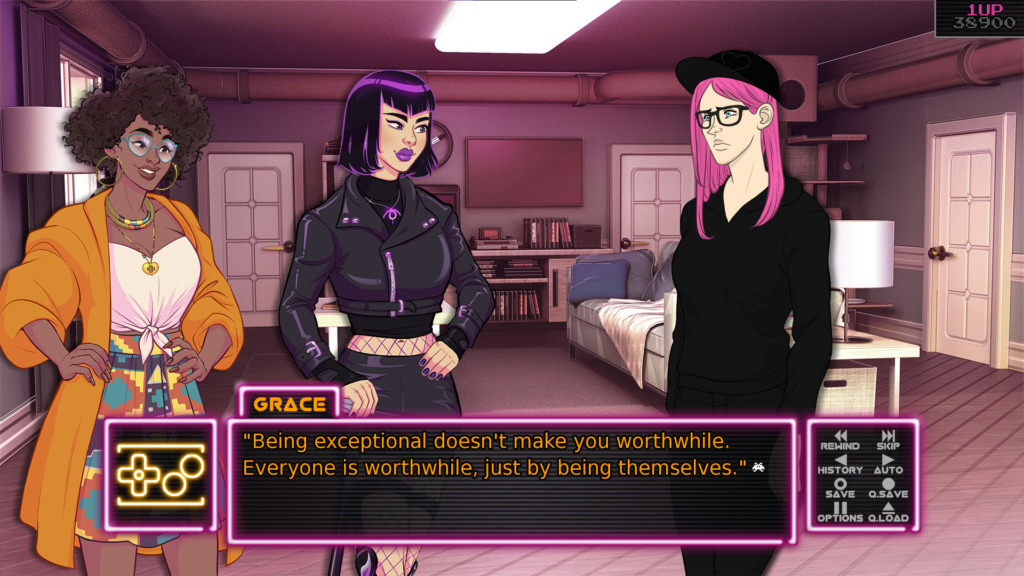
- Polyamorous route! I was lucky enough to stumble into it in my first playthrough. I came in blind, so I wasn’t expecting this at all, but the game gave me enough clues that I could Google it and keep on the right course to unlock this option. I liked both characters and wasn’t sure which one to choose, so it’s cool that I didn’t have to choose in the end. 😉 They have a very cute and healthy dynamic in my opinion.
- Many qualify of life improvements from the original. There’s icons/avatars to represent each character, and you can even pick your own; you can navigate locations visually on a map instead of choosing from a simple dropdown menu; there’s more character customization; there’s also a few more meaningful meters/choices during gameplay, which make the story even more nuanced.
- Great voice acting. As in the original Arcade Spirits, the voice-acting of this game is incredible. Great casting, each voice fits their character perfectly, and it just makes the game come alive. I just wish there was more of it!
- Excellent writing. Each character has its own voice, and choices are more weighted than in the original – being brash isn’t always necessarily bad, being quirky isn’t just a gimmick, etc. There’s more nuance. Considering how your choices affect dialogue, I can’t imagine what their design document must have looked like. Extremely complicated, I assume. I also like the order/chaos mechanic for Iris. I still have to replay the game to see what happens if I choose chaos, but it’s a very nice addition. Iris feels more alive and like a character of her own.
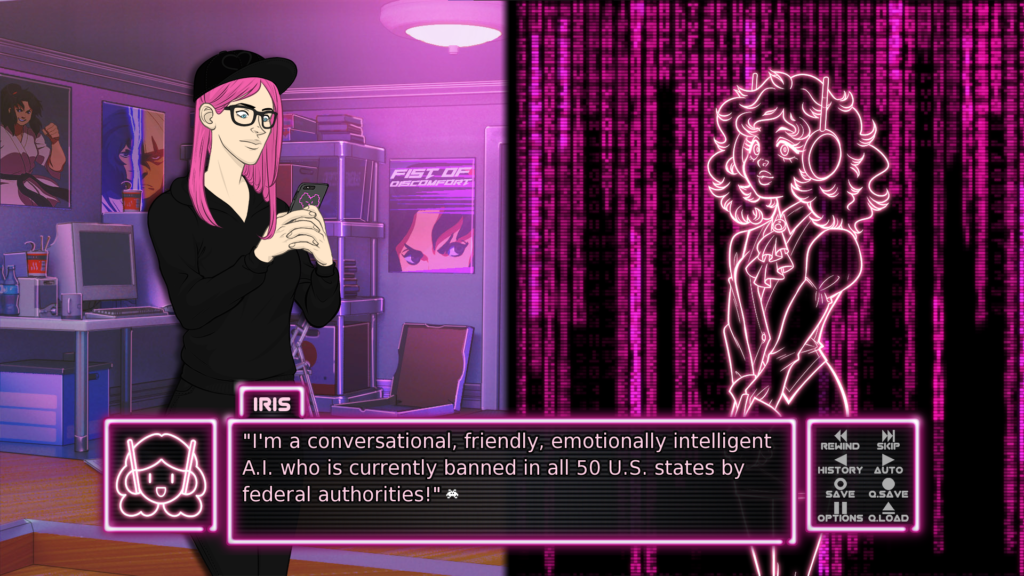
- Genre subversion. I like the use of VN conventions as a way to subvert expectations, like not being able to choose the “reasonable” option, having a (MAJOR SPOILERS) creepypasta alternate personality counter, etc.
The not so nice stuff
- The character customiser is lackluster. One of the first things that you come across when you play the game is the character customiser. While I will admit that this customiser is much better than the original’s (there’s more pronoun options, you can wear different accessories, etc.), it’s still clearly not enough. The player character looks lifeless and flat, particularly when compared to the other characters. The “corpulent” options look terrible (they don’t fit the face properly), there’s not enough color options to pick (you can only choose highly saturated colors), the clothes are bland and almost all haircuts are horrendous.
- …and it’s grossly overused. But that’s not all. The original game also had a pretty bad main character design, and a very limited editor; but that was fine because the main character was unique in the game that they existed in. However, this time other NPCs use the same generator as the player, leaving them with no personality at all. I understand cutting corners in development, but it would’ve been better to use generic NPCs that looked bland instead of using the same template that the main player uses. I can kind of understand having the rival character use the same template (although it’s still weird), but random one-off characters? No way. It makes the player feel like an NPC instead of an actual character. You don’t want a self-insert character to feel like an NPC. They have to be generic, yes, but unique. This is an enormous design mistake, the biggest in the game I’d say.
- Too much plot and political commentary, too little human interaction. The writing of the game is excellent, but I feel like the dialogue leans too much on the main plot and the underlying political commentary (there’s A LOT of political commentary in this game) and too little on the human interaction, romantic or otherwise. There should be more dialogues and scenes not directly tied to the plot or to some deep understanding of society or human experience. Characters speak all the time about heavy topics, like gender, accessibility, capitalism, environment, depression and mental health, family acceptance, living with disability, etc. Don’t take me wrong, those are topics that I (and most of the intended target audience) am interested in, and in most cases I believe they tackle them in a sensible manner. I love a text heavy game, and I even love a text heavy game that is not only fun but also makes you think; however, it’s just TOO MUCH, too often. Clearly a lot of thought was put into it, but ultimately it’s too heavy-handed. Such discussions aren’t properly balanced with normal, lighter everyday conversation, so at points the characters feel stiff, like walking manifestos.
- Too much plot, too little romance. Unfortunately, the previous point bleeds into the “romance/friendship sim” part of the game. This is a game with a main mechanic (the friendship/love meter) heavily tilted towards romance, but where there isn’t much romance at all plot-wise. I detect a bit of a ludonarrative dissonance here. This also happened in the previous installment, in some romance routes more than others, but in AS: TNC it’s more apparent because of the constant political commentary. Personally I took the (SPOILERS SPOILERS) polyamorous route with Grace and Jynx, and I was looking forward to seeing some of the dynamics in conversation, maybe even how Grace opens up to her family about this relationship despite her anxiety, or how Jynx learns to welcome so many people into her living space or something; but this wasn’t as developed as I had hoped. It feels like the characters and plotlines were under-developed and under-used.
- The main character doesn’t have much of a personality. In the original Arcade Spirits, this was diminished because they had a friend from before the events of the game (Juniper) that gave them context as a character, and they also had previous jobs, a family curse, etc., stuff that gave them a backstory of sorts. In AS: TNC they try to make the main character too much of a “blank slate” for the player to project themselves into, and the character ends up being a bit of an empty husk. Which I understand, I guess; we can’t have it all. But it’s still a shame, since it turns conversations between the player character and the other characters much more flat and less interesting. An approach more similar to the original would’ve been preferable, imo.
- Inadequate treatment of disability. One of the main characters/possible romance interests has a physical disability, wears leg braces and uses a cane. While the game’s treatment of her disability throughout the story is mindful enough (although, as with the rest of the political discourse in the game, there’s way too much of an over-focus on her disability), the first scene when you meet this character is… how to say it… a bit of a disaster. I felt extremely uncomfortable since you (SPOILERS) aren’t able to respond in a respectful way when meeting her, you can only choose bad options, making the main character look like an asshole. I understand that they did it that way to create some kind of “teaching moment” for the audience, but they failed to consider two things: their intended audience has a high chance of being already educated on this matter, so forcing them to be assholes is a bad move. And, even worse: disabled people do also play games, they might even be playing this game in particular because there’s a main character who is obviously disabled, and they may (and have been, if Steam reviews are anything to go by) be rightfully offended at being unable to respond properly in that situation. Not a good idea.
- Inadequate treatment of suicide. Many players have commented that the game’s treatment of suicide is tactless, used as a gimmick, and should’ve been better informed. I myself didn’t realise this while playing, since it’s not a topic that I personally know much about, but I can totally see it afterwards after reading people’s reviews. I don’t think it’s as blatant as the disability thing, but it could’ve been certainly done better. In any other game I wouldn’t complain, but the team behind AS clearly want to do representation as well as possible from all fronts, so this should certainly be improved upon.
Verdict
Do I recommend AS: TNC? Overall, yes, absolutely yes. Despite its faux-passes, the writing is clever, intriguing and thought-inducing, and the characters are quite delightful and varied. If you’re a fan of visual novels, you’ll definitely enjoy its play on the VN genre conventions, its meaningful choices, relationship meters (hidden or otherwise) and lovely background and character art. If you like queer stories, and/or stories that tackle mental health or social justice issues, here you’ll find representation aplenty.
Be aware of the content warnings and the game’s shortcomings, but consider that, regardless of its imperfections, the authors clearly put a lot of thought into doing representation as well as possible, and this is one of the best queer-friendly, body-positive stories you’ll be able to find in the indie scene.

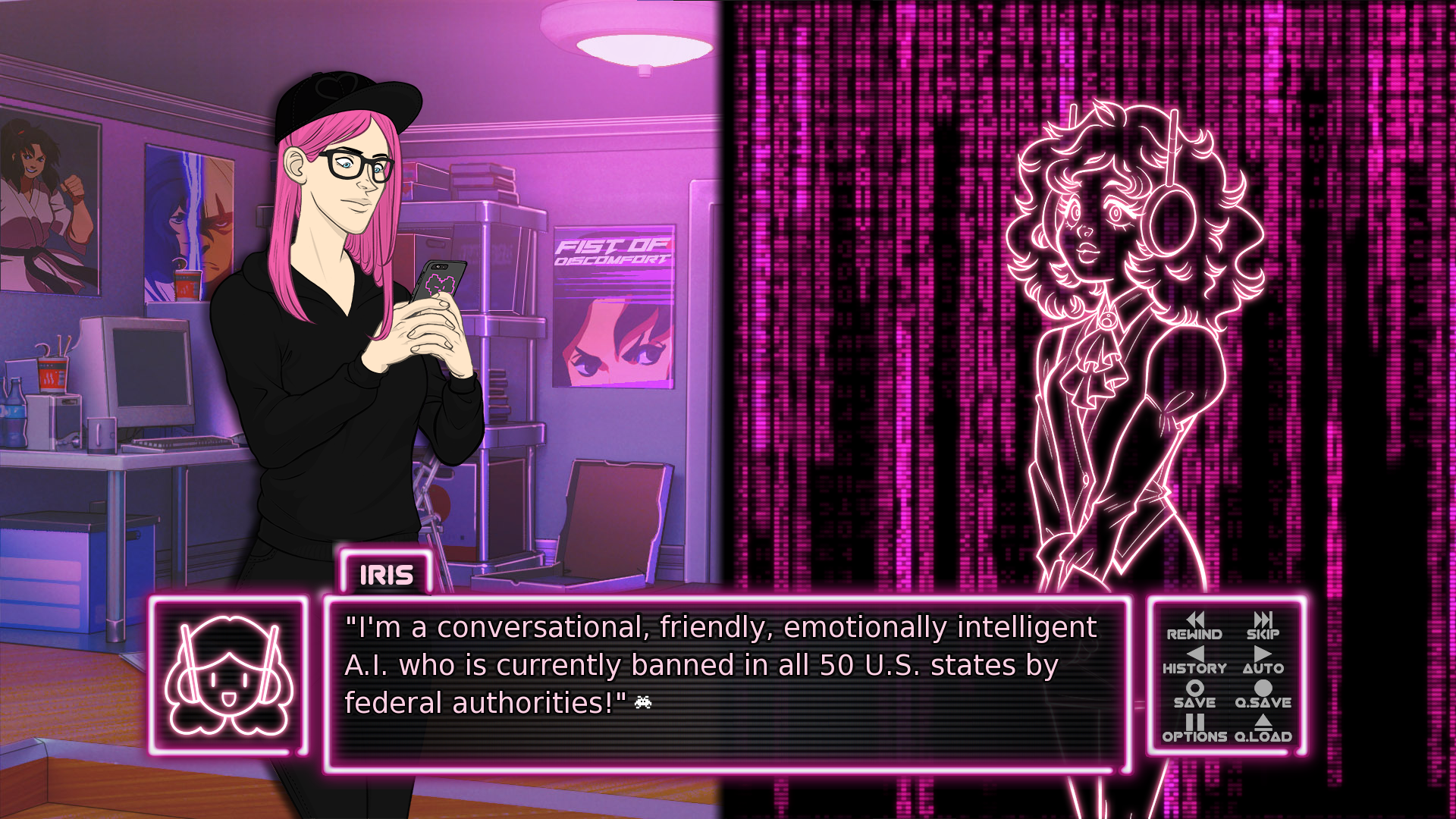
Leave a Reply